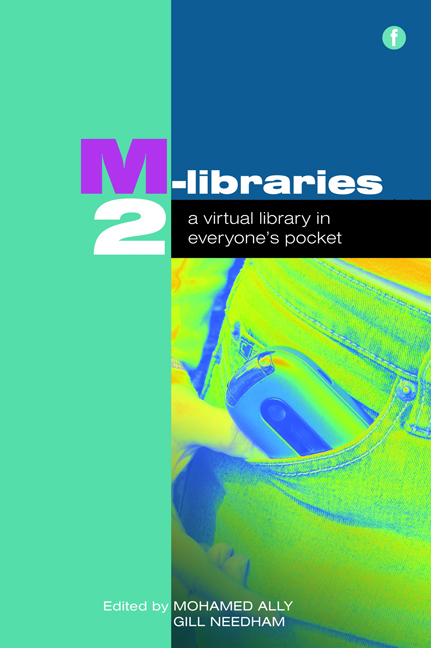Book contents
- Frontmatter
- Contents
- Acknowledgements
- Contributors
- Foreword
- Introduction
- PART 1 M-LIBRARIES: DEVELOPMENTS AROUND THE WORLD
- PART 2 TECHNOLOGY IN M-LIBRARIES
- PART 3 APPLICATION OF M-LIBRARIES
- PART 4 M-LIBRARIES AND LEARNING
- PART 5 BUILDING THE EVIDENCE BASE FOR M-LIBRARIES
- 24 Enhancing library access through the use of mobile technology: case study of information services provided by six mobile companies in Bangladesh
- 25 M-libraries: information use on the move
- 26 UCLA and Yale Science Libraries data on cyberlearning and reference services via mobile devices
- 27 Say what? An SMS transcript analysis at New York University
- Conclusion
- Index
24 - Enhancing library access through the use of mobile technology: case study of information services provided by six mobile companies in Bangladesh
from PART 5 - BUILDING THE EVIDENCE BASE FOR M-LIBRARIES
Published online by Cambridge University Press: 08 June 2018
- Frontmatter
- Contents
- Acknowledgements
- Contributors
- Foreword
- Introduction
- PART 1 M-LIBRARIES: DEVELOPMENTS AROUND THE WORLD
- PART 2 TECHNOLOGY IN M-LIBRARIES
- PART 3 APPLICATION OF M-LIBRARIES
- PART 4 M-LIBRARIES AND LEARNING
- PART 5 BUILDING THE EVIDENCE BASE FOR M-LIBRARIES
- 24 Enhancing library access through the use of mobile technology: case study of information services provided by six mobile companies in Bangladesh
- 25 M-libraries: information use on the move
- 26 UCLA and Yale Science Libraries data on cyberlearning and reference services via mobile devices
- 27 Say what? An SMS transcript analysis at New York University
- Conclusion
- Index
Summary
Abstract
While mobile technology is readily available in Bangladesh, as in many other developing countries, innovations in its use for library and information centre service development have surprisingly not started yet. This chapter explores the prospects of using mobile technologies for information services in Bangladesh. The research explores the existing information services of six mobile phone companies of Bangladesh. The chapter shows the current status of information technology at the various library and information centres of Bangladesh. The research identifies some library and information services that could be offered using mobile technology. Recommendations are made as to how mobile technologies might be used effectively in designing various information services and satisfying the information needs of various users.
Introduction
Bangladesh emerged as an independent, sovereign country in 1971 following a nine-months war of liberation. It has one of the largest river deltas in the world, with a total area of 147,570 sq km. Bangladesh has a population of about 140 million, making it one of the most densely populated countries of the world. The literacy rate amongst the population is 43.1%. Over 98% of people speak in Bengali, but English is widely spoken (National Web Portal of Bangladesh).
Research on library development in Bangladesh shows that before mid 1800s most libraries were privately owned and their use was limited to certain groups. The library movement started with the establishment of four public libraries in the district towns of Jessore, Bogura, Barisal and Rangpur in 1854 (Shuva, 2005). Subsequently, libraries were established in other district towns. After the war of liberation in 1971 library development increased substantially, with many public and special libraries being established after independence.
Status of ICT in different types of libraries in Bangladesh
Computers were first introduced into Bangladesh in 1964, with the installation of an IBM 1620 computer at the Atomic Energy Commission (BASIS, 2005). Subsequently, use of computers was introduced in the Institute of Statistical Research and Training (ISRT) in 1964; Bangladesh University of Engineering and Technology (BUET) in 1968; Janata Bank in 1969; Adamjee Jute Mills Ltd in 1970; and the Bureau of Statistics in 1973.
- Type
- Chapter
- Information
- M-Libraries 2A virtual library in everyone's pocket, pp. 221 - 234Publisher: FacetPrint publication year: 2010



